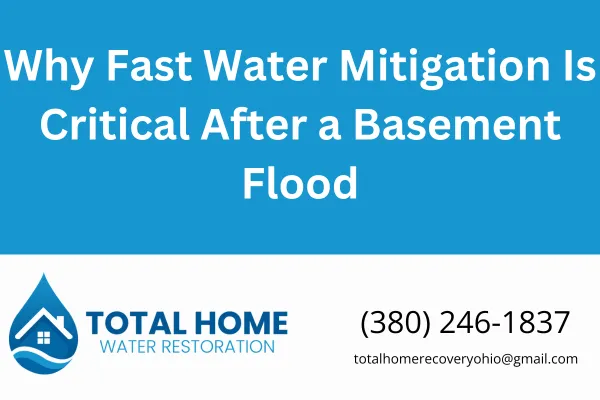
Why Fast Water Mitigation Is Critical After a Basement Flood
Why Fast Water Mitigation Is Critical After a Basement Flood
If you’ve just walked into a wet, flooded basement, time is not on your side. At Total Home Water Restoration, we’ve seen how fast water damage can spread—and how much worse it gets when cleanup is delayed.
Whether it’s a burst pipe, sump pump failure, or a storm that overwhelmed your foundation, the clock starts ticking the moment water touches your floors.
Here’s what you need to know—and do—right away.
The First 24–48 Hours Are Everything
Water doesn’t just sit. It soaks, seeps, and spreads. Within hours, it can:
Soften drywall and warp wood framing
Soak into insulation and flooring
Creep up walls through capillary action
Saturate personal belongings
Start growing mold (usually within 24–48 hours)
The longer water sits, the deeper the damage and the higher the cost.
Mold Doesn’t Wait
We’ve had homeowners in Grove City call us three days after a flood, thinking they had time. By then, their basement walls already showed signs of mold. According to the IICRC S500 Standard, microbial growth can begin in as little as 24 hours under the right humidity and temperature.
Mold can quickly become a health hazard—especially if your HVAC system is running and spreading spores throughout the house.
Structural Damage Can Happen Fast
In finished basements, flooring, drywall, trim, and insulation are all at risk. Wet carpet padding needs to go. Laminate or engineered wood floors start buckling. And saturated drywall loses its integrity, putting you at risk of collapse or rot in framing.
We follow ANSI/IICRC S500 drying standards to determine how deeply water has penetrated—and how to dry it safely and completely.
Insurance May Require Immediate Action
Many homeowner policies expect you to take "reasonable steps" to prevent further damage. That means:
Stopping the source of water if safe
Calling a professional for mitigation
Documenting the damage with photos
Keeping receipts of any emergency repairs
We help you navigate the claim process and make sure your water loss documentation meets standards.
What We Do—Fast
When we respond to a flooded basement, here’s how we move:
Emergency water extraction with powerful pumps and vacuums
Moisture readings using professional-grade meters and thermal imaging
Setup of commercial dehumidifiers and air movers for rapid drying
Cleaning and disinfecting of affected surfaces
Mold prevention treatments when needed
Every job gets a customized drying plan based on IICRC S500 protocols.
Real Talk from the Field
A family in Dublin called us after their basement flooded during a spring storm. They waited until Monday to call—three days after the water came in. We had to remove all the baseboards, cut two feet up the drywall, and pull the carpet. Mold had already started behind the entertainment center.
If they had called Friday night, we could’ve dried everything in place.
Don’t Wait—Act Fast
A flooded basement is overwhelming. We get it. But delaying cleanup only makes things worse. Fast water mitigation means fewer repairs, lower costs, and a faster return to normal.
If your basement is wet, don’t guess. Call us today.
Call Total Home Water Restoration at 380-246-1837
Located at 4141 Hoover Rd, Grove City, OH 43123
Serving Columbus, Grove City, Hilliard, Dublin, Westerville, and nearby areas.
